Back to The Discus.com Learning Center
Back to The Discus.com Learning Center
It is the dream of a great many would-be and current discus keepers to have a fully landscaped, planted discus community display. Not just a community of discus but a full blown community display. I can hear the “experts” now: “It can’t be done”, “Discus should only be kept in species tanks”, “You must have a bare bottom tank to keep discus”, “Other fish will only bring in disease to these delicate fish”. To all of this I say “Hogwash.” I’ve been keeping discus in community tanks for more than forty years. Another misconception is that wild discus are more delicate than the tank raised varieties (one pair of ours spawned 14 times in a community tank before we sold them). All of my discus are wild. I went down and caught them. They aren’t more delicate, they have just gone through a terrible ordeal getting from the rainforest to your home and need a little TLC. These guys are real survivors.
Raising discus in a community display can be done and done quite successfully by not trying to acclimate the discus to your conditions but by acclimating your conditions to the discus. You see, compatibility doesn’t just refer to the fish getting along. Compatibility refers to the total system i.e., plants, water quality, temperature, lighting and fishes. If one of these component parts is “off” then the whole system is off. Each part interacts with all of the others. If people can’t grow plants then, chances are that their fish aren’t too happy either.
Discus come from waters that are so pure, they are like tea-stained distilled water. If your tap water has a pH of 7.8 then you are going to have to “acclimate” your water to create this display (get a deionization or reverse osmosis system). Discus are from waters with almost no detectable hardness and a pH of between 4.0 and 5.5. They must derive their mineral requirements from their food because it certainly isn’t in the water.
All of the community fish listed later in this article as compatible with discus are from very soft acidic water, primarily blackwater streams. One of the important things about low pH waters is the absence of many types of bacteria; especially those that can cause disease in aquarium fish. Bacteria and fungus just love an alkaline environment. This is why people who try to acclimate discus to hard alkaline water find them to be so “delicate” (they are also the ones with an arsenal of chemicals to “cure” their delicate fish). The discus have no natural defenses or resistance to these organisms because they have evolved over millions of years in an environment that is without them.
Another problem encountered, especially in newly set up displays in which the water is alkaline, is ammonia. Discus have never seen ammonia and it is deadly. The reason that they haven’t encountered ammonia is that, in an acidic solution, toxic ammonia NH3 becomes ammonium NH4+ which is the preferred form of nitrogen that plants use for food. See the interaction? This is why most of our aquatic plants come originally from acidic waters.
What we are creating is an environment that is compatible for both fish and plants. When choosing plants, try to limit your choices to two or three varieties. Use lots of them, I mean lots, and your display will look much more natural. Be sure to leave a large open area in the front so that food doesn’t get trapped in the plants. Discus like to go down to the bottom and pick around so, give them an area to feed and to be seen. Also, the more plant cover they have, the more secure they will feel and the more they will be swimming out in the open. Amazon sword plants Echinodorus sp. give off natural antibiotics when healthy and are my plant of choice for this display. Be sure, if you choose other plants, that are from South America. Although this isn’t a biotope display (you probably wouldn’t want one anyway, yech – ugly), we can at least make it a geographic one.
Temperature plays a big part in this display and is kept at 86F degrees (30C). Don’t worry, the sword plants grow just fine. At this temperature, after properly quarantining the fish, you will never have a problem with “ich” icthyophthirius, the white spot disease that looks like your fish are sprinkled with salt. Ich just can’t take the heat. This is as good a time as any to state a most important rule: Never, never, ever medicate a display tank! Period. Don’t do it. That is why you have a quarantine tank. Remember, all medications are poisons and you will never remove all of them from the display no matter how much water you change. Another rule: never use algaecides. Yes, they do kill some algae. Algae are plants. Algaecide will harm your display plants as well. Don’t use it. In fact, don’t use anything to treat anything. Chances are that you have too many fish and/or you are overfeeding. Change more water. Change it more often, at least once a week and at least 1/3 to 1/2 of the tank’s volume. Every healthy tank is going to have some algae so don’t worry too much. This isn’t a hospital. Just wipe the glass when you change water and you should be just fine. You’ll be surprised how few, if any, problems you’ll have with disease.
Now that the display tank is set up and running, you can begin cycling the tank. One point here before we begin with fishes: How many discus do you plan on keeping? You will have to allocate an absolute minimum of 10 gal. and preferably 15 gal./fish. To find out how much water your tank actually holds the formula is as follows: L x W x H in inches and divide the answer by 231. Remember to allow for gravel, rocks and wood. Really, to keep four discus and some tetras, etc., you should have a tank no smaller than a “100 gal” advertised size. This will net you in the area of 70 gal. of actual water.
The first fish to be added will be the bottom feeders. I prefer to use dwarf cichlids. The following are all high temperature blackwater fish that are efficient feeders and get along well with discus.

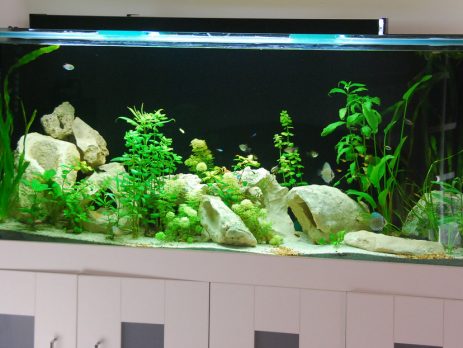
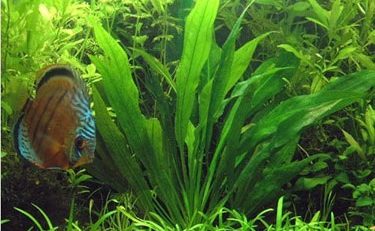
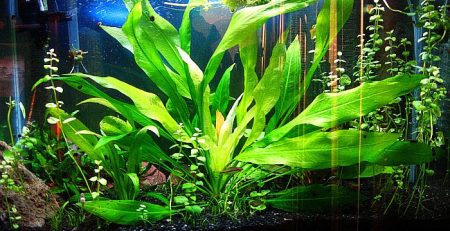
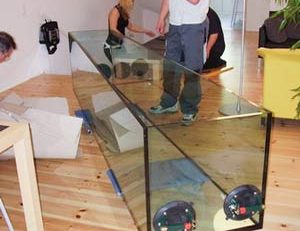
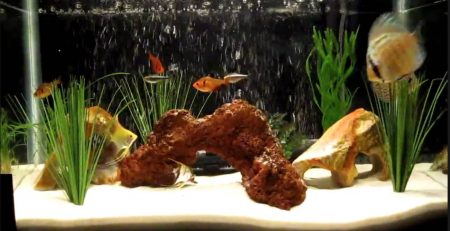
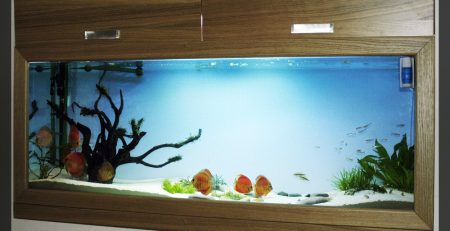
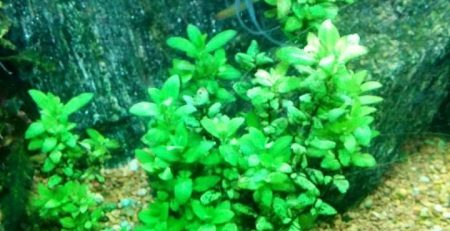
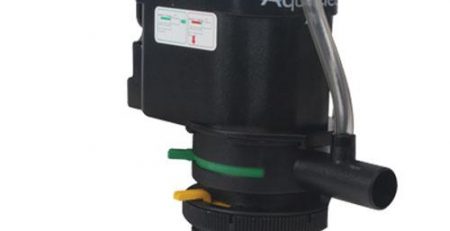
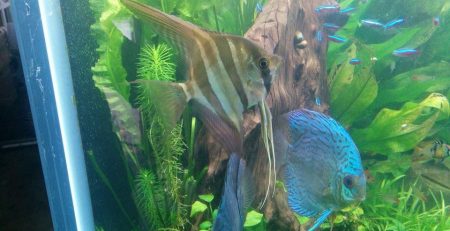
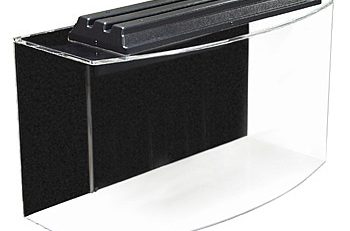
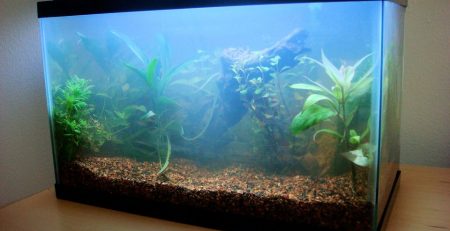
Leave a Reply
You must be logged in to post a comment.